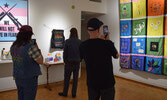Festival Art Gallery opens professional season with 'Rural Queer Agenda'
BY SCOTT STEPHENSON
On Friday, the 51st season of the Blyth Festival officially began with the opening night of Drew Hayden Taylor’s Sir John A: Acts of a Gentrified Ojibway Rebellion. In the days leading up to opening night, the theatre at the Blyth Centre for the Arts (BCFA) was absolutely abuzz with the collective energy of a cast and crew coming together to bring audiences the story of Bobby Rabbit - a young Ojibway man driven to an act of defiance by an unjust system that has shaped his entire life.
At the same time, amidst all the hustle and bustle of the theatre, there was a real life act of collective defiance quietly unfolding in the white oasis of the BCFA’s Bainton Gallery. As final dress rehearsals were taking place on the other side of Memorial Hall, gallery curator Kelly Stevenson was by herself, hanging and arranging the work that makes up the BCFA’s latest collective art show: The Rural Queer Agenda.
When the idea to put on a show dedicated solely to the work produced by queer, rural artists popped into Stevenson’s head last year, it wouldn’t go away. She realized that, as the longtime manager of one of Huron County’s oldest professional art galleries, she had the power to make it happen. So she did. Stevenson put out a call for participants online, and the submissions began flowing into Blyth. What has emerged is a show that is not just powerful - it’s absolutely beautiful. Festival-goers can’t help but be drawn in by the truly charming aura emanating from the gallery - from outside the space, it’s all bright, bold colours and rainbows.
But once visitors step inside the gallery, they begin to notice the finer details - of shadows within the rainbows. There is a feeling of disruption running through so much of the work in The Rural Queer Agenda - as though some great and terrible hand is exerting some invisible force on the natural order of things. There is an ebullience to this work born from knowing one’s true self, but at times, it’s shot through with the fear that comes from intolerance. These two forces mingle together in this show - it might just make a few people wonder why they were ever afraid of something so beautiful, and so alive.
On Saturday, the opening night of The Rural Queer Agenda, contributing artist Mabe Kyle seized the moment, eloquently addressing the captive crowd with a poem full of hard-earned honesty about the reality of being queer in a rural environment. “The thing about weeds is they’re only weeds if they are considered to be growing unwanted,” they said, before offering some sobering statistics. “It is a fact that more than half of transgender and non-binary youth seriously considered attempting suicide in the past year…. It is a fact that having at least one accepting adult can reduce the risk of a suicide attempt among LGBT youth by 40 per cent.” Kyle informed the audience that the simple act of respecting chosen names and pronouns can go a long way towards helping queer people feel accepted. “Call me a flower, don’t call me a weed,” they said lyrically.
Kyle also touched on a common trope - leaving rural life for an urban environment in search of acceptance. “I believe that one day, it gets better, when I’m older, and I move to the city to finally be queer, because queer folks don’t belong in the country,” they began, before pivoting into a refusal to settle for one world or the other. “You can take the queer kid out of the country, but you can’t take the country out of the queer. You can’t take the country out of me,” Kyle declared. “I’m standing here, centre stage, more than my wildest dreams believed I could ever achieve. I’m alive. I am present. I am here.”
For a very long time, queer Canadians have been fighting for the basics: acceptance, equality and a sense of safety. But The Rural Queer Agenda is defiant in its desire for more than that. “Let them thrive,” Kyle demanded. “In all the ways they dream of a future where trans lives are celebrated and embraced. Where trans youth feel at home in their bodies and I, in my childhood’s wildest dreams, that I could survive in all glory, gender queer beyond belief. And I prayed to thank God for the gifts they have given me - queerness is the most beautiful gift of them all.”
The Rural Queer Agenda will be at the Bainton Gallery in Blyth until July 19.

